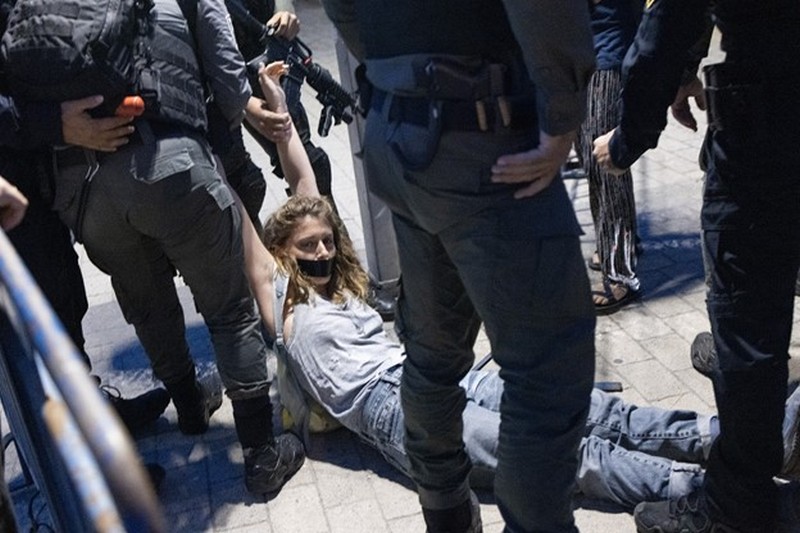By Oren Ziv
24 Jan 2024 – Since 7 Oct, Israel’s police have systematically banned, restricted, and attacked protests against the army’s assault on Gaza, instilling a sense of fear among Jewish and Palestinian citizens alike.
On the evening of Jan. 16, several dozen activists gathered in front of the Kirya in Tel Aviv, home to Israel’s Defense Ministry and army headquarters. It was one of the first Jewish-Israeli demonstrations explicitly condemning the military’s assault on the Gaza Strip since the war began, and the police acted swiftly to suppress it: dozens of officers were deployed in advance, and they refused to allow the protest to take place in its intended location. They confiscated signs reading “Stop the massacre” on the grounds that these offended public sentiment. One activist was arrested, and several others were assaulted by police.
This sequence of events is far from exceptional. Since October 7, Israel’s police have been implementing a consistent policy of preventing or limiting any protest against the war — in contrast to protests in solidarity with the hostages and their families, which have been permitted in certain areas. This policy is still in effect despite Israel’s Supreme Court issuing an interim injunction earlier this month prohibiting National Security Minister Itamar Ben Gvir from interfering with the policing of demonstrations; in large part, police appear nonetheless to be enforcing the minister’s desired crackdown on freedom of expression during the war.
Anti-war activists across the country — Palestinian citizens as well as Jews — who were interviewed for this article all mentioned one word: “fear.” Even veteran political activists say they have never been so fearful of protesting. They are afraid of being arrested, which for Palestinian citizens could spell months in prison. More than ever, they said, it is dangerous to show solidarity with the people of Gaza, and they feel that politicians’ belligerent rhetoric is directly impacting police behavior.
“From the early days of the war, it was clear that this was the policy,” Maysana Mourani, an attorney with the Haifa-based human rights and legal center Adalah, told +972 and Local Call. “The police have taken on new powers to immediately repress protests, even when a protest permit isn’t required, because of their supposed ‘lack of manpower.’”
Adalah has petitioned the Supreme Court several times since October 7 to challenge such police bans on the right to protest. Despite the Court’s intervention earlier this month, however, it has repeatedly failed to intervene on numerous other occasions, meaning the police have had broad discretion to decide which protests to permit. “It depends on the identity of the demonstrators and the slogans,” Mourani said.
5 February 2024
Source: transcend.org

